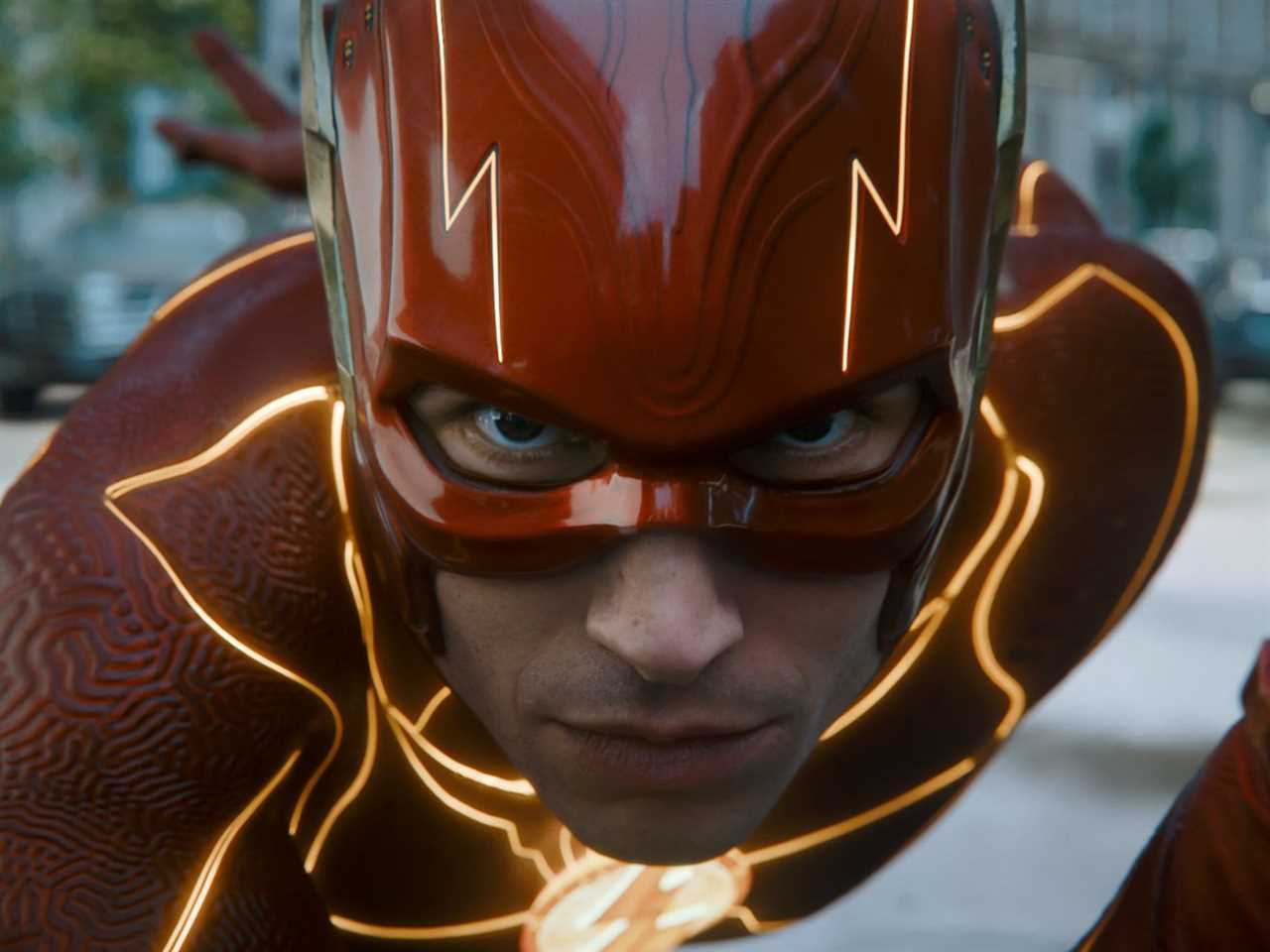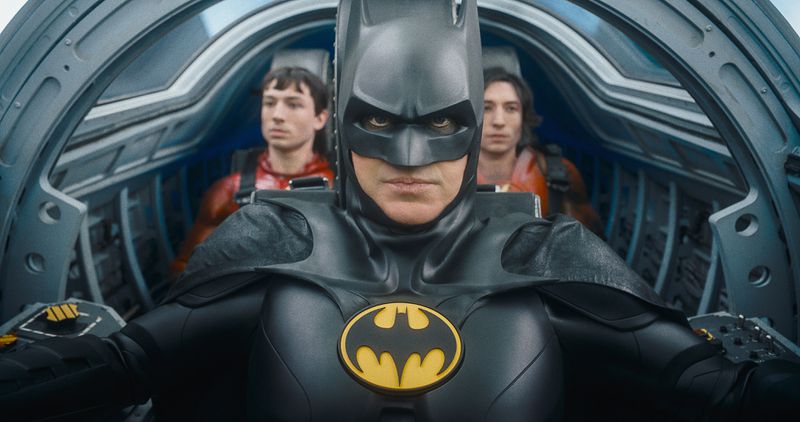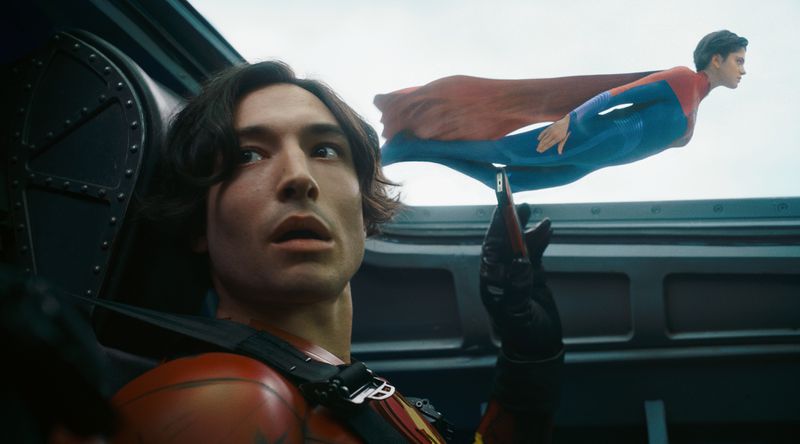
The Flash is really about bad decisions.
What does Warner Bros. want with The Flash? The new film, out on June 16, is beset with complications. It’s one of the last of the films made before director James Gunn completely revamps the studio’s superhero schedule, stars problematic tabloid mainstay Ezra Miller, and feels, in many ways, an awful lot like a Marvel multiverse movie.
So where does that leave us?
Playing it surprisingly safe, for one thing.
Like a lot of superhero movies about limitless universes, The Flash seems content to do just enough: The fight sequences are serviceable, Miller’s frenetic humor has its moments, and the super-speed connection to time travel feels different — a feat when there’s so much multiverse in pop culture today.
But it’s not hard to feel like the movie exists just to get us to a finish line and ostensibly a sequel. You’re left wishing it would be courageous enough to break the pattern and give us a movie that actually wants to capture the endless possibility it refers to time and time again. There’s a lot of squandered potential.
Playing it safe has also been the marketing strategy Warner Bros. has applied to The Flash. Over the last year, Miller has been in the news for their multiple arrests and destructive behavior, including accusations of leading a kind of cult. Miller has barely been promoting the movie.
Despite touting a brand new start for Warner Bros.’s superhero strategy, the studio has seemingly stuck by Miller — mainly by hoping you forget their personal life — and left the door open for them in the hope that this will be a hugely successful movie. In this way, The Flash not only is a movie about the infinite possibility of our pasts and futures, but also who gets to have those chances.
Barry Allen meets the multiverse
Like almost every superhero movie in the last five years, The Flash is about the multiverse — the idea that there are endless alternate timelines, punctuated by significant events, that run parallel to our own. What makes the DC Comics universe slightly different from its peers is that its superheroes are usually products of said events.
A random mugger killing Martha and Thomas Wayne turns their son Bruce into Batman. Krypton’s destruction sends Kal-El a.k.a. Superman to Earth to become its protector. Steve Trevor crash-landing on the Amazons’ home of Paradise Island (a.k.a. Themyscira) put in motion a series of events that turned Diana into Wonder Woman.
The Flash a.k.a. Barry Allen (Miller) has one of these origin stories too, which we see in the movie. His mother Nora (Maribel Verdú) was murdered, and Barry’s father Henry (Ron Livingston) was wrongly convicted of the crime. Barry, a child at the time, was there and knows his dad didn’t kill his mom. This spurs Barry into pursuing a career in forensics, and, thanks to a combination of a stray lightning bolt, chemicals, and freak coincidence, he’s granted super speed while working at a lab late one night.
Barry has the power to move as fast if not faster than the speed of light, which is tantamount to a life cheat code. Laundry and chores take three seconds. Work is just a fraction of a day. Imagine going to Europe or Asia over a lunch break. Or I guess, yes, you could use this power to help your father.

Courtesy of Warner Bros. Pictures™ & © DC Comics
If he wanted, Barry could easily break his father out of prison and flee the country to somewhere without strict extradition laws. (Not that I condone prison breaks or fleeing the country but, c’mon.) His dad is a saint, however, and trusts things like people, justice, and the legal system. The arc of the universe is long but will always bend toward good, Henry Allen believes.
Barry isn’t that naive.
To be fair, that’s understandable. The legal system on DC Comics’s Earth is a complete failure (the main Earth, at least; it’s always possible there’s a good one in the multiverse somewhere). Lex Luthor, the Joker, Harley Quinn, Poison Ivy, and their super-powered ilk terrorize Metropolis and Gotham on what seems like a weekly basis, yet Henry Allen is serving a life sentence at Iron Heights Penitentiary. Henry Allen, who is innocent, is the only person on DC Earth that law enforcement has successfully kept in prison!
Frustrated with his father’s false imprisonment, Barry starts to think big picture: Since he can travel at super speed, he could essentially break time, go into the past, save his mom, and subsequently keep his dad out of jail. The problem with that, as Bruce Wayne (Ben Affleck) explains, is that changing small events could have a ripple effect and alter the current timeline, if not the multiverse itself.
Barry’s decision to meddle with time is why we have this movie (which is also based on the comic book event known as Flashpoint).
By going back in time and saving his mom, Barry sets up a timeline in which he finds a younger version of himself that’s only had a good life: a mom who’s alive, a dad who’s not in jail, a world where the worst thing to happen to him is dirty laundry. He’s fixed things, miraculously, but Barry slowly realizes that young him is actually kind of clueless. Similarly, Young Barry can’t process how his old, grumpy self is actually a superhero. The conceit of old trauma-ridden Barry meeting young, trauma-free Barry allows Miller to lean into goofy physical comedy and a charming buoyancy that’s often missing from the grim array of DC-based comic book movies.
Both Barrys Allen soon discover that tweaking the timeline has caused some odd things to happen. Wonder Woman and Aquaman don’t exist in younger Barry’s world. Neither does Superman. Gotham’s crime rate has also been affected, effectively eliminated in fact, which has rendered Batman obsolete.
As the movie’s onslaught of trailers and marketing materials have thoroughly spoiled, the Barrys also find themselves zipping through millennial nostalgia. Michael Keaton reprises his role as an older, crankier Bruce Wayne — complete with Danny Elfman’s voluminous score. In his old age, this Bruce bruises and bleeds more easily but is wise. He’s the one to explain that tweaking the multiverse has consequences. You can’t play god and dole out justice, says someone who has effectively retired from playing god and doling out justice on a nightly basis.
And just like his younger counterpart, Keaton’s Batman is right.
Barry’s decision has rendered this Earth defenseless against General Zod (the infamous Superman villain and antagonist of 2013’s Man of Steel). In order to save this world, the world that their mom lives in, the Barrys have to figure out how to defeat Zod and help older Barry get back to his original timeline — seemingly impossible tasks that super speed by itself can’t fix. What makes Barry Allen a hero isn’t his powers, but rather, the understanding that he’ll need to make a sacrifice, and the guts to go through with it.
The Flash is good but ... at what cost?
The Flash is largely successful because it’s, yes, self-aware and funny enough and because millennials have fond, strong memories of our childhood entertainment. Watching Keaton don the cape and cowl one more time wouldn’t be as impressive if it weren’t Keaton (or the CGI illusion of him) underneath that mask. The voice, that wink, that sly smirk — it makes you remember how fun it was to see Keaton play the character. It’s hard not to relish the opportunity to see him do it one more time.
At the same time, though, this movie that is all about looking back at the past with fond memories is something of a relic itself.
After stops and starts, the movie began filming in 2021. This was four years after Miller starred as Barry in 2017’s extremely dismal Justice League from director Zack Snyder. Despite Warner Bros. giving Snyder the budget to reshoot and release his version of The Justice League, the studio and the creative parted ways, and with him went his cinematic vision of DC’s superheroes.

Courtesy of Warner Bros. Pictures™ & © DC Comics
Further, Warner Bros. announced this past October that Peter Safran and director James Gunn would be in charge of the slate of DC’s new superhero movies — basically becoming the Warner Bros. version of Marvel President Kevin Feige. And with that announcement came the news that Affleck, Henry Cavill, and Gal Gadot would not reprise their roles as Batman, Superman, and Wonder Woman — the trinity tent poles of DC comics.
In that same span of time, Miller was arrested multiple times and was accused of assault, disorderly conduct, and burglary. They were also accused of forming a cult, including allegations of distressing behavior with a nonbinary child. Miller released a statement apologizing for their behavior in August 2022, and said they would seek treatment for mental health issues.
The Flash existing as a completed movie is an achievement in and of itself. That it’s kinda good and has fun moments is a feat.
As you’re watching the movie about super speed and traveling in time, though, it turns out the biggest ask when it comes to the cinematic suspension of disbelief is trying to forget Miller’s personal life. Miller hasn’t been part of the movie’s press tour. The movie’s marketing has spoiled the surprise of Keaton, a strategy seemingly employed because they can’t sell their big star.
Warner Bros., Gunn, and Safran have been saying how great this movie is and encouraging fans to go see it. They’ve said that the future for Miller at Warner Bros. is open and dependent on Miller’s commitment to recovery.
What they haven’t explicitly said, and what seems to be a major factor in Miller’s future as the Flash, is how many hundreds of millions of dollars this movie will make. What the studio does and doesn’t see as profitable may also explain why the studio nixed an almost-completed Batgirl project but has stuck with Miller.
Figuring out Warner Bros.’s calculus is an inextricable part of watching this movie.
Is The Flash stupendously good? Not really! Is it even worth getting into a discourse of art versus artist? No. Is there anything exceptionally exceptional about Miller’s performance? I don’t think so! The Flash and Miller are fun, but Hollywood is full of charming young-ish actors who don’t have arrest records and disturbing cult allegations that could easily hit these beats!
If The Flash makes a billion dollars, Miller stays on. If it flops, Miller is ostensibly out. In a few weeks it’ll become clearer what Miller’s role will be, what Warner Bros.’s future looks like, and if this gamble paid off. And that feels like a story, maybe a truer one about how superhero movies get made.
----------------------------------------
By: Alex Abad-Santos
Title: In The Flash, Warner Bros. hopes you forget Ezra Miller’s troubles
Sourced From: www.vox.com/culture/2023/6/12/23755803/the-flash-movie-review-ezra-miller
Published Date: Mon, 12 Jun 2023 11:30:00 +0000
Did you miss our previous article...
https://consumernewsnetwork.com/politics-us/maxine-waters-and-elizabeth-warren-clash-on-investment-rules






